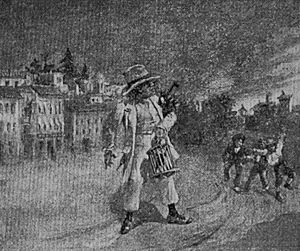Cabeza de Perro facts for kids
Quick facts for kids
Ángel García
|
|
|---|---|
 |
|
| Born | 1800 Igueste de San Andrés, Tenerife, Spain
|
| Died | ???? Santa Cruz de Tenerife, Tenerife, Spain
|
| Piratical career | |
| Nickname | Cabeza de Perro |
| Rank | Pirate |
| Base of operations | Caribbean |
Ángel García was a Spanish pirate born in 1800. He was known by his nickname, Cabeza de Perro. This nickname means Dog Head in English.
Contents
Who Was Cabeza de Perro?
Ángel García, also known as Cabeza de Perro, was a pirate from Spain. He was born in the year 1800 in a place called Igueste de San Andrés. This town is located on the island of Tenerife, which is part of Spain.
Pirate Adventures in the Caribbean
As a pirate, Ángel García sailed and operated mainly in the Caribbean Sea. This area was a popular spot for pirates during his time. He lived in La Habana, Cuba, in a neighborhood called San Lázaro.
His main ship was a type of sailing vessel called a brig. It was named El Invencible, which means "The Invincible." He also used other ships, like one called El Audaz, meaning "The Daring." These ships helped him in his pirate activities.
Capture in Tenerife
Ángel García was eventually caught. He was arrested at a place called Castillo de Paso Alto. This castle is in Santa Cruz de Tenerife, which is also on the island of Tenerife. After his arrest, he was executed there.
Is This Pirate Story Real?
Today, many people believe that the story of Cabeza de Perro might not be entirely true. Some historians think he was not a real person. Instead, they believe he might be a character based on another famous pirate.
This other pirate was named Amaro Pargo. Amaro Pargo was a well-known Spanish pirate and privateer. There are no clear records or proof about Ángel García's pirate actions. There is also no solid evidence of his execution in Tenerife. This makes his story seem more like a legend than a true historical account.
See also
 In Spanish: Cabeza de Perro para niños
In Spanish: Cabeza de Perro para niños
 | Jewel Prestage |
 | Ella Baker |
 | Fannie Lou Hamer |

